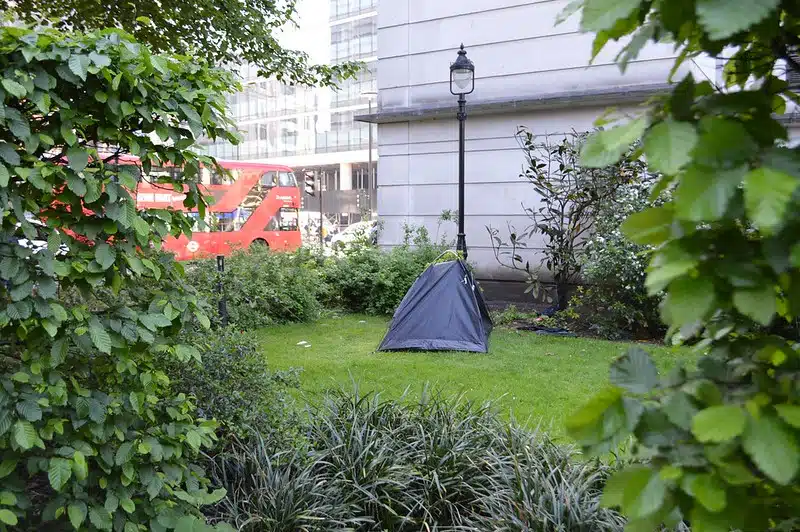How to talk about destitution, homelessness and visa charges clearly and effectively
Posted by Esther Raffell on February 19, 2024
Credit: Matt Brown via Creative Commons
From asylum seekers who are unable to work, to soaring fees for visas and public services in the UK, economic hardship is a crucial building block in the UK’s hostile environment to migration. Destitution leaves people who should be thriving members of our communities on the margins of our society, unable to build the safe and stable lives we all deserve.
At the same time, the reasons for destitution and the solutions to supporting people out of it can often be complex. It’s easy for those who work on this matter every day to end up using jargon and specialist language which doesn’t communicate the human impact to the public at large.
For this reason, in 2022, IMIX developed a messaging guide for how to talk about this with a range of audiences and communicate the human impact of this reality through press and media outlets.
However, since then, there have been even more changes leading to destitution among those in the immigration system. Here are some suggestions of how to speak about destitution in a way that the average reader or listener will understand.
Visa and health charges for migrants
In October, the government increased public sector pay by further taxing migrants in the form of increased visa costs and NHS fees. You can find a comprehensive list of the measures here. They include hiking costs to be naturalised as a British citizen, apply for health and care visas, study visas and indefinite leave to remain.
Suggested messaging
This government’s pay deal is a pay cut for working families who came to the UK from abroad to build their lives, and have to budget for thousands in visa fees and hospital costs each year. To add insult to injury, many of those workers work in the public sector as schoolteachers, carers, doctors, nurses and cleaners. 10% of schoolteachers are migrants. 25% of carers are migrants. 10% of NHS staff are migrants.
Migrants helped build the NHS. Now they fear getting into debt because of it.
A focus on survival will push families to the margins, rather than thriving as part of our communities.
We urge this government to find a solution that unlocks the potential of everyone, not hurts and harms the health of people simply because they came to the UK from somewhere else.
Refugees evicted from their accommodation
A change in government practice, combined with the sudden processing of backlog claims, has led to people with refugee status being made homeless, sleeping rough and charities being inundated with requests for help. In August, The Home Office has reduced the notice period a successful asylum seeker is given to leave their accommodation once they have been granted refugee status to just seven days.
Pressure and protest from the migration, asylum and housing sectors led to the reversal of this change in December 2023. Still, for many refugees, there just isn’t enough time before they must vacate their accommodation to get a job or access benefits, as previous research has conclusively shown.
Suggested messaging
Could you find a new home, set up your bank account and get a new job in less than a month? This is what this government is asking refugees to do. It doesn’t make sense to offer someone safety, and then set them up to fail. This has caused an unnecessary homelessness emergency. Refugees want to work, pay their own rent and live independently, but they need more than a week’s notice. This government is choosing to let people sleep on the streets, in airports and buses. It’s forcing local charities and councils to hand out sleeping bags to people who are just trying to do the paperwork to start a new life. We urge this government to listen to frontline workers and give refugees more notice and a fair chance.
The Illegal Migration Act
The Illegal Migration Act, which became law on 20th July 2023, denies the right to seek asylum to anyone arriving via a route considered ‘irregular’, including anyone who crosses the Channel on small boats. Instead, the Home Secretary has a legal duty to remove them to Rwanda. There have been roughly 35,500 asylum applications this year from people arriving via this route and there is yet to be any place that these individuals can be sent to because the Rwanda scheme has been ruled unlawful. Moreover, in the event it is deemed lawful, there is little evidence it could accommodate this number of people.
The full implications of this scenario are still not fully known, but most experts predict a mass increase in people with no recourse to statutory help or public funds finding themselves homeless or at risk of serious exploitation. All those who have their applications immediately deemed invalid will be in legal limbo. The resulting impacts in local areas will harm everyone, with increased rough sleeping, potential community tension, and more child poverty.
Suggested messaging
This government’s migration legislation is a poverty emergency. People who have experienced the worst of human nature and came here to seek safety will be deprived of proper food and shelter.
This law harms everyone. We will see more rough sleeping, hungry children, and unnecessary pressure on vital resources. This asylum system already means that parents cannot afford school uniforms for their children, and newly recognised refugees are sleeping in tents on the streets. This isolation is cruel and costly to the public purse, and the government is choosing to make this situation worse.
We call on local leaders to create opportunities and basic resources for our community members, regardless of their immigration status.



